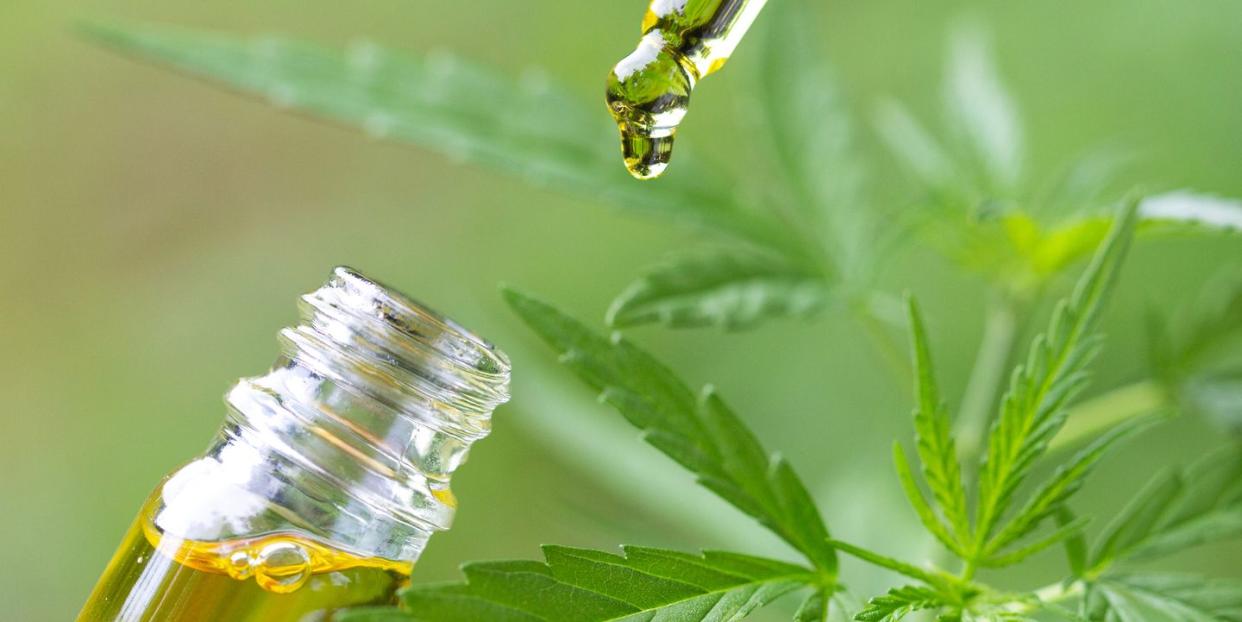Experts Warn That CBD Products Are "Routinely Mislabeled"

CBD is everywhere. You can go to a gas station, coffee shop, or drugstore and find a range of over-the-counter products containing CBD in the form of lotions, beverages, deodorants, and more. But is it actually beneficial to ingest this cannabis-derived oil or to rub it on your body?
CBD is a cannabidiol that makes up one of more than 400 compounds found in the oils of cannabis plant species, which include marijuana and hemp. It's often associated with medicinal properties, such as relieving anxiety, chronic pain, insomnia, inflammation, and more.
But so far, there isn't science to back up these claims, and not all CBD products are even the same. Prevention and Good Housekeeping held a CBD Summit featuring expert panelists with backgrounds in science, research, medicine, and law, to bring us up to date on the current regulations and evidence behind CBD. Here's what they want you to know.
1. "CBD products are routinely mislabeled."
CBD products are not currently regulated by the FDA or any regulatory body to oversee the manufacturing and sale of hemp CBD products.
"CBD products are routinely mislabeled," says Stacia Woodcock, PharmD, director of education at the International Research Center on Cannabis and Health. "There are no testing requirements for the ingredients in CBD and no regulatory body overseeing potency to prove that what's on the label is actually what's contained within the product." There's also a lack of regulation for excipients, like pesticides, heavy metals, or contaminants.
As a result, many CBD products are mislabeled with incorrect or misleading information about dosage, she said. For instance, CBD in small doses hasn't been well-studied, and a bottle that's labeled 600 mg might sound like you'd be getting a lot. However, that number often refers to the entire bottle, making each dose more like 5 to 20 mg. There's also confusion over CBD derived from a plant and a synthetic version, which can be dangerous. In 2018, over 50 people were hospitalized in Utah after consuming synthetic products labeled improperly. And even if you are getting the real stuff, the label might not be accurate: A 2017 study published in JAMA found that seven out of 10 tested CBD products did not contain the amount of CBD indicated on the label.
This makes it harder for the consumer to discern which CBD products are actually safe, Woodcock says.
2. "The hype has outpaced the science."
Our panelists Julia Arnsten, M.D., M.P.H., Lynn Parodneck, M.D., and Jahan Marcu, Ph.D. spoke about the current state of research, noting that there is a disparity between consumer expectations and what science says about the benefits of CBD.
Many CBD products make claims to relieve health conditions, but the experts say "the hype has outpaced the science." The only FDA-approved CBD drug is Epidiolex, which has been shown in clinical research to treat of seizures associated with two rare forms of epilepsy, Lennox-Gastaut syndrome and Dravet syndrome. There is a lack of evidence to outline the benefits and adverse effects of CBD due to gaps in research.
"In the U.S., there is a problem with the ability to do research with cannabis and humans," Marcu says. Cannabis is a schedule 1 substance, meaning the government declared it of no medical use and unsafe. "This is because most of the research around cannabis has only focused on the harm, rather than the benefits," he said. Many of the studies were conducted largely in males or animals, and others failed to isolate CBD without other ingredients.

However, Arnsten, Director of the Center for Comparative Effectiveness Research at Albert Einstein College, says that with more research, scientists may be able to uncover more evidence-based benefits of CBD and certain health conditions. She highlighted a 2017 review by the National Center for Biotechnology Information, which found that CBD may be an effective treatment for chemotherapy-induced nausea and vomiting, chronic pain, and spasticity symptoms in patients with multiple sclerosis.
But until CBD becomes regulated, the experts advise avoiding CBD products that make health claims to relieve certain conditions, aside from Epidiolex. "If a marketer is making a serious disease claim that this product will cure a particular disorder, than that's a problem because the science isn't there," says Keith Fentonmiller, senior attorney at the Federal Trade Commission. He says this year we can "expect to see some significant enforcement activity for these serious claims."
3. "It's the consumer's responsibility to discern what's best for them."
There are a number of organizations working in different ways to encourage regulation around CBD production, research, manufacture, and trade, like the U.S. Hemp Authority, the United Natural Products Alliance, the Federal Trade Commission, and the National Organization for the Reform of Marijuana Laws. But until then, it's basically up to the consumer to understand which cannabis products are safe and what to avoid.
"There are a lot of companies that are contracted with third party companies to test their products and make their certificate of analysis and lab results available to the public, so people can see that what they say is in the product is actually in the product," Woodcock says.

Companies may also voluntarily apply for certification from the U.S. Hemp Authority, which is given to companies who demonstrate compliance to quality control standards. Marielle Weintraub, president of the board of the U.S. Hemp Authority, says they've certified 30 companies and farmers so far. The organization certifies CBD cosmetics, food, beverage, and supplements, not smokeable CBD, which experts agree should be avoided.
To find reputable companies, panelists recommend looking for Certificates of Analysis on a brand's site—good ones should make them available to show that what's actually in their products. Some panelists recommend heading to CVS, Vitamin Shoppe, GNC, and Walgreens because they are more likely to partner with companies to test and verify the quality of the CBD products sold in their stores. Others suggest buying directly from a manufacturer that you've determined is reputable.
Ultimately, there are no clearly defined answers around CBD yet, and so much research is yet to come. If you plan to use CBD, "be methodical about how you look for information, ask questions, and use trusted sources only," says Ellie Siegel, attorney at Longview Strategic and Carmody Siegel.
Like what you just read? You’ll love our magazine! Go here to subscribe. Don’t miss a thing by downloading Apple News here and following Prevention. Oh, and we’re on Instagram too.
You Might Also Like

